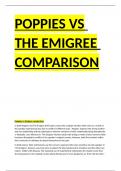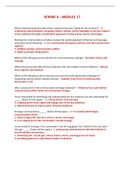Exam (elaborations)
Grade 9 Poppies vs Emigree comparison essay
A grade 9 answer comparing The Emigree and Poppies for AQA GCSE English Literature. This is not guaranteed a full mark answer as it is written by a student but has grade 9 ideas, context, interpretations, which may help as a source for knowing what a grade 9 essay looks like.
[Show more]




